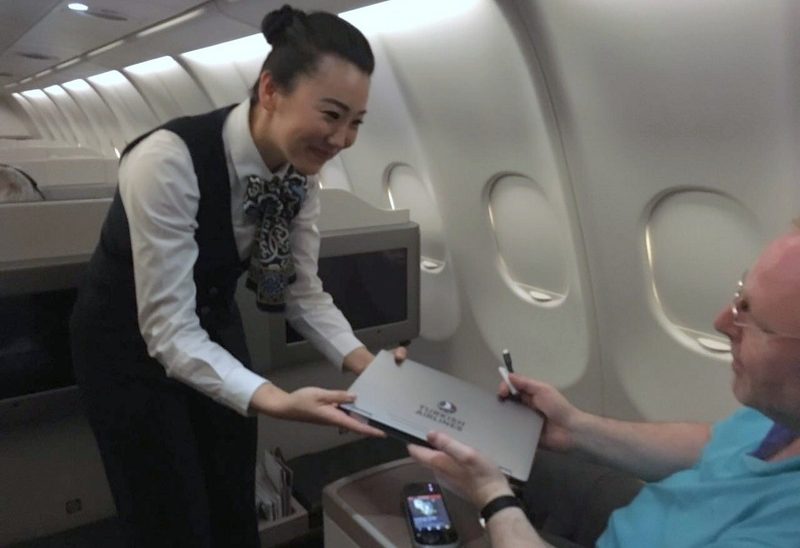
On July 2nd, Abu Dhabi-based airline, Etihad Airways became the first airline to be exempted from the controversial U.S Laptop Ban. Abu Dhabi was just one of ten airports in eight countries throughout the Middle East that had been affected by the ban. But after months of intensive lobbying, the U.S. authorities agreed that the affected airports could introduce new security measures in lieu of the complete ban on passengers taking electronic items into the aircraft cabin.
As expected, a number of other airports were quickly exempted following Abu Dhabi’s escape. Dubai quickly complied with the new rules, as did Istanbul Ataturk Airport in Turkey and Doha Hamad International Airport, the home of Qatar Airways.
A couple of weeks have now passed since the new security measures were introduced and we’ve now finally learnt that all ten airports have been exempted from the full Laptop Ban. The final airport to be fully compliant with the measures was Riyadh’s King Khalid International Airport in Saudi Arabia. The news was broke by a Tweet from the U.S. Department of Homeland Security (DHS).
As a reminder, these were the ten airport’s to be subject to the ban since March:
- Queen Alia International Airport (AMM), Jordan
- Cairo International Airport (CAI), Egypt
- Ataturk International Airport (IST), Turkey
- King Abdul-Aziz International Airport (JED), Saudi Arabia
- King Khalid International Airport (RUH), Saudia Arabia
- Kuwait International Airport (KWI), Kuwait
- Mohammed V Airport (CMN), Morocco
- Hamad International Airport (DOH), Qatar
- Dubai International Airport (DXB), United Arab Emirates
- Abu Dhabi International Airport (AUH), United Arab Emirates
The security measures will be onerous but at least passengers will be able to travel with their electronic devices, including laptops and tablet devices in their possession. Yet, while the U.S. has addressed both the passenger experience problem and the obvious safety risk of storing hundreds of personal electronic devices in an aircraft’s hold, the same can’t be said of the United Kingdom.
The United Kingdom’s Laptop Ban
You may remember that several days after the original U.S. Laptop Ban was introduced, the UK followed with its own ban. In contrast, to the U.S. ban, the UK didn’t include the United Arab Emirates or Qatar and didn’t name specific airports. Instead, the ban covered all airports with direct flights to the UK from any of the following countries: Turkey, Lebanon, Jordan, Egypt, Tunisia, Saudi Arabia. The policy banned all electronic devices larger than the following dimensions from the passenger cabin: Height = 16cm, Width = 93cm. Depth = 1.5cm.
But unlike the U.S. ban, we’ve heard very little from the British authorities about the long-term plan to address their security concerns. Even as the U.S. ban was lifted in Istanbul, the Brits remained steadfastly tight-lipped.
To get around the ban, Turkish Airlines has been offering laptops for customer use in Business Class on all flights from Turkey to airports in the United Kingdom. But if the latest rumours are to be believed that service may not be needed for much longer.
Sources: Turkey may soon be exempted
According to Reuters, sources within the Turkish diplomatic service have said the UK intends to lift the ban soon. Apparently, the UK’s foreign minister, Boris Johnson called Turkey’s Prime Minister to tell him of the plan. Unfortunately, Britain’s Department for Transport, who regulate aviation safety, has refused to be drawn on speculation.
Instead, a spokesperson commented: “The safety and security of the travelling public are our top priority. We keep our aviation security measures under constant review, but we do not comment on speculation or leaks.”
Of course, it’s not just Turkish Airlines who are affected by the UK Laptop Ban – the measures also include British Airways, as well as a number of British airlines who operate charter flights to popular holiday resorts throughout Turkey. There is no information when other countries named in the ban will get a similar call from Johnson.
Related
Mateusz Maszczynski honed his skills as an international flight attendant at the most prominent airline in the Middle East and has been flying ever since... most recently for a well known European airline. Matt is passionate about the aviation industry and has become an expert in passenger experience and human-centric stories. Always keeping an ear close to the ground, Matt's industry insights, analysis and news coverage is frequently relied upon by some of the biggest names in journalism.







